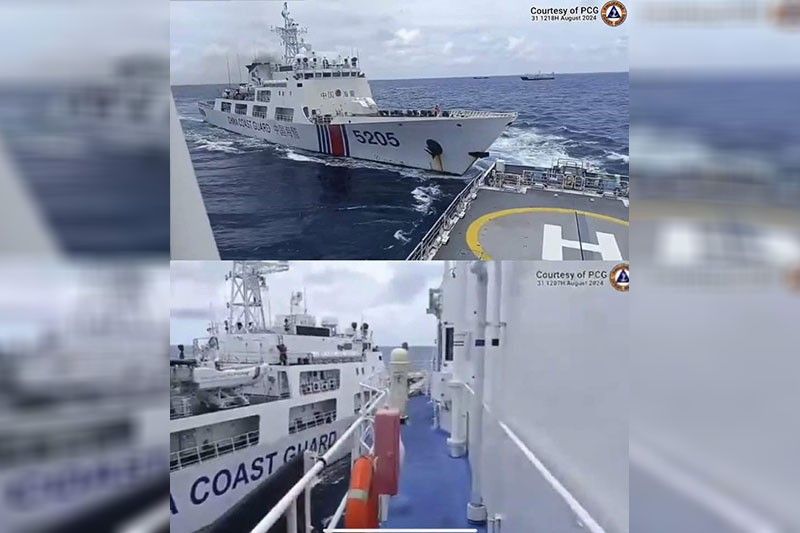‘De-escalate’ means surrender of WPS, retired generals lament
Reporters asked AFP chief Romeo Brawner at what point he’ll seek allies’ help in West Philippine Sea rotations-resupplie“When our troops are already hungry, they don’t have food anymore because our resupply missions have been blocked and they’re on the verge of dying,” he replied.
Retired generals were aghast. “That’s very demoralizing for our soldiers,” former PMA superintendent Edilberto Adan said. “They’ll think they won’t be rescued until near death.”
Commander-in-chief Bongbong Marcos has ordered the AFP to “de-escalate tensions” with China. “But what’s de-escalate – to give up WPS features?” Adan wondered. “I don’t think China knows what the term means or even uses it.”
Philippine sailors are stationed in Ayungin (Second Thomas) Shoal, and Marines in nine Kalayaan (Spratly) islets. Coast guards aboard BRP Teresa Magbanua are surrounded by China military ships at Escoda (Sabina) Shoal near Palawan.
“The AFP chief of staff is accountable if the Philippines loses any WPS feature,” Adan said. The retired lieutenant general chairs Advocates for National Interest. ANI groups former AFP, Army, Navy and Air Force heads who also served civilian agencies.

US naval escorts “are an entirely reasonable option,” Indo-Pacific Command chief Adm. Samuel Paparo told a defense forum in Manila on Aug. 27. But Brawner declined the offer, preferring to “do it by ourselves, we’re going to try all avenues.”
Two days later they convened the Phl-US Mutual Defense Board. After which, Brawner announced his “troop starvation” threshold.
“AFP’s mission is clear,” Adan cited the Constitution’s Article II, Declaration of Principles, Section 3, “It’s goal is to secure the sovereignty of the State and integrity of the national territory.”
At first 40, then 52, now 71 China navy warships, Coast Guard gunboats and maritime militia steel trawlers blockade Escoda. The Philippine Coast Guard said China is preparing to occupy Escoda like Panatag (Scarborough) Shoal in 2012, then fortify it like Panganiban (Mischief) Reef in 1995.
Two PCG and one fisheries bureau vessel were rammed and watercannoned there en route to ROREs on Aug. 19 and 25. But spokesman Alexander Lopez of the newly formed National Maritime Council called China’s aggression an “isolated incident.”
Last June, 45 Chinese axemen on five speedboats rammed, boarded and hacked an unarmed Philippine Navy rubber craft. One of six beleaguered Filipino commandos lost a thumb. As NMC head, Executive Secretary Lucas Bersamin described it as “a misunderstanding, an accident.”
Two days after Brawner and Lopez’s utterances, two giant China Coast Guard ships thrice rammed PCG flagship Magbanua in Escoda. A week since, the latter’s crew are low on food and water.
Polling ANI members including ex-defense and AFP head Renato de Villa, Adan said: “All believe the chief of staff – not the President, defense secretary, national security adviser, National Task Force-WPS or NMC – is militarily answerable.”
Among ANI’s members are ex-AFP chiefs Alexander Yano, Victor Ibrado, Eduardo Oban and Emmanuel Bautista, PNP chief Recaredo Sarmiento, Navy flag officer-in-command Mateo Mayuga, Air Force general Melchor Rosales and Adm. Emilio Marayag, Association of Generals and Flag Officers president.
China ramming has disabled four PCG and three fisheries bureau craft since June, PCG spokesman Commodore Jay Tarriela said. “In due time China will wipe out our patrols,” security specialist Chester Cabalza, PhD, quoted coastguards.
Cabalza, International Development and Security Cooperation founder, agreed that “de-escalate” can confuse. He said Chinese ramming and boarding of Philippine patrols constitute armed attack that can activate the Phl-US Mutual Defense Treaty.
The 1951 pact obligates each side to help the other in case of armed attack in the Pacific, including South China Sea. The Chinese rammers are armed with big guns and those who boarded the Philippine boat wielded axes, spears, machetes and lethal military-grade lasers.
The Philippines insisted that the June 17 clash wasn’t an armed attack.
International maritime lawyer Jay Batongbacal, PhD, said Manila and Washington shouldn’t quibble over legalese: “Just convene the MDT Board, set guidelines, then issue a policy statement on armed attack.”
China is out to grab the whole WPS exclusive economic zone, and Escoda is just the latest flashpoint, Batongbacal said. A China island-fortress there will threaten air and naval bases in Palawan. It will deny Philippine access to Ayungin, oil- and gas-rich Recto Bank and Kalayaan’s main Pag-asa island.
Former Supreme Court justice Antonio Carpio and Stratbase ADR Institute president Victor Manhit urged the AFP to tap allies’ support in WPS ROREs. “Australia, Japan, Canada and France are most willing,” Cabalza said.
“The way our government characterizes our responses is all tactical,” Adan noted. “Aside from reporting unprovoked Chinese hostility, we have to show resolve.”
Brawner was aboard a RORE ship that China watercannoned in December. Last month, after a China fighter jet fired flares on a Philippine reconnaissance plane, he joined an air patrol to test fire AFP flares.
“The AFP is acquiring more naval and air craft, but it’ll take three years to complete, including sailor and pilot training and construction of berths and hangars,” Adan said.
“Meantime, we must deter China incursions. That’s why we need our defense and security partners. Ignore taunts that we’re a pawn in the fight between China and America. They don’t own WPS, we do.”
* * *
Catch Sapol radio show, Saturdays, 8 to 10 a.m., dwIZ (882-AM).
Follow me on Facebook: https://tinyurl.com/Jarius-Bondoc
- Latest




















